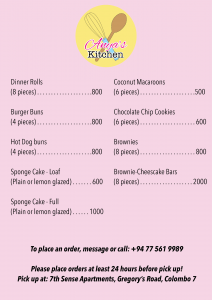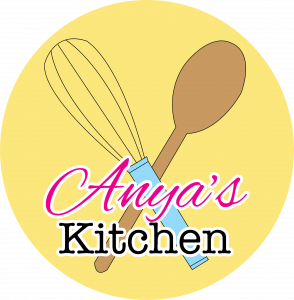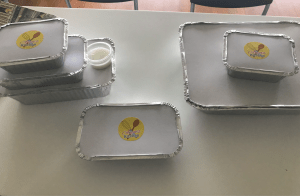My CAS Project…A Description and Reflection
The summer of 2020 was a dark period in the lives of many. The COVID-19 pandemic had taken over the world, and people all over were struggling to live life as normal under its shadow. The situation in Sri Lanka was no exception. The government, in an attempt to control the infection rate, ordered a country wide lockdown, and everybody was imprisoned in their own homes. While this is remembered as a low period for most people, the summer lockdown was actually one of the most productive and enjoyable periods of my life.
I love to cook. My little kitchen is my happy place, and I can find a release there for every mood and any stress. The first few days of the lockdown, I spent all my free time cooking and baking up a storm. Where people were craving to go to a restaurant and eat anything other than a home-cooked meal, my family members were eating new and interesting dishes for breakfast, lunch and dinner (and between meals too!) But this didn’t last long. The fridge was soon full of half eaten desserts and dishes, and my mother begged me to slow down, and take a break for a few days. So I stopped, and tried to fill my day doing other things. I read, played the piano, watched Netflix, even painted my wall, but it wasn’t the same. And then it struck me – I could bake and cook as much as I wanted as long as there were people who wanted to eat the food! I decided to start a business. I would take orders, bake, make some money, and then buy that new iPhone I had been dreaming of. It was a perfect plan.
Alas, it wasn’t as easy as I thought it would be. Running a business, no matter how small, is still a challenge for a sixteen-year-old girl that has no idea what she’s doing…so I sat down with my parents, and pitched my idea to them. They were all for it, but hesitant to believe that I could successfully take this idea and make it a reality. My dad explained everything I’d have to figure out, from buying the ingredients, to factoring in the cost of machinery, electricity, and the actual time and effort I’d be putting into completing orders. Not only that, but I’d have to market myself too, and make sure that I was getting enough orders and charging enough money to actually make a profit. But as I registered the magnitude of the project, I only got more excited. It felt so amazing to think that if I did all of this properly, I’d actually have my own business! I’d be making money at the age of sixteen! So I threw myself into research. First I had to decide on a menu. I chose a small number of items that I was confident I could make perfectly each time, and that I knew would be popular with a large number of people. Then came the more difficult part. Pricing. First I had to figure out the exact cost of the ingredients, as well as the packaging that would be used for each order. That was a tedious task, and I spent hours trying to figure out just how many rupees went into a cup of flour, a teaspoon of salt, or a sheet of baking paper. When I finally figured that part out, I doubled the value to factor in my effort, and to make sure that I was actually making a profit. Satisfied with my final results, I conducted some market research, and was pleased to find that my prices were lower than every bakery in town. I hoped this would attract more customers.
Proud of the work I had done, I went to update my parents. And that’s when my dad threw a curveball at me. He decided that he would charge me rent for using the kitchen, as well as charge me for the electricity that my oven and mixer would use. I was enraged. This meant I would have to work harder, and complete more orders in order to save up enough to buy a phone. Or, I’d have to go back and redo all my calculations, and set new prices for everything. Unwilling to postpone my dream of a new iPhone, I went back and recalculated all my prices.
Then came the fun part! I designed a logo for my business: Anya’s Kitchen, and a menu that matched, and then circulated them on social media. And then I printed multiple sticker sheets with my logo on it, to stick on top of each order as it went out. I even set up an instagram page for my business, where people could send me orders. Then, all I had to do was wait.
I didn’t have to wait long. My mother, acting as my marketing agent, had done a fantastic job in bringing me lots of customers. My menu was on parent groups, her friends’ social media pages and more! I was receiving multiple orders a day, and every time I got another one, I felt a rush of excitement about the fact that I would get to go back into the kitchen. I was baking for hours every day, and my family watched with concern that I would soon tire myself out. I waited for it to happen too…but it never did. Being in the kitchen energized me. I mean, my feet definitely hurt after standing in the kitchen for hours without even a three minute break, but I never grew bored of it. I worked hard all summer, and the money kept rolling in. It rolled out, too, as my father diligently collected 50% of my earnings every week to pay for rent, electricity, and the cost of the ingredients.
When the lockdown finally ended, and school was about to start up again, I had to slow down and prepare to close my business, as there was no way I could handle the workload of the IB curriculum alongside running my business. Unfortunately, I hadn’t made enough to buy my iPhone after paying my final rent, electricity and ingredient bills. While I had really enjoyed my summer, I was still slightly disappointed by the outcome.
And that’s when I got an email from my grandfather. I read the forwarded article, and I felt my heart sink as I took in the information. The article was from an NGO in India, in the city where I was from, called The Bharat Prakash Foundation. This organization’s goal was to help children in poverty have equal access to education. They described the situation Covid had left them in, as multiple children had lost one, or both parents during the pandemic, and could not afford to go to school. The article highlighted a list of children who needed money to continue their education, as well as provided information on how they had lost their parents. Tears stung my eyes, as I forced myself to read the entire email. By the end of it, I felt overwhelming guilt. Suddenly, an iPhone seemed so unnecessary and irrelevant to me. The money I had made could make a real difference in the lives of these children. I wrote to my grandfather immediately, and got in touch with the NGO.
With all the money I had earned that summer, I managed to pay for the entire school tuition of three orphaned children. When the organization sent me the names and photos of the children I had helped, I felt happiness and satisfaction that I knew no iPhone could ever have brought me!
Anya’s Kitchen taught me a lot. A huge takeaway was my realization that the easiest way to feel happy is to help someone, and to try and make a difference in someone’s life. But I learned a lot more than that. I found that I enjoyed every minute of the process – from calculating the costing, to designing my logo, to marketing my products. I realized that I had a passion for business, and that it was something I wanted to study further, and perhaps make a career out of in the future. My biggest worry as a kid was that I’d never realize what I wanted to do in life. While being a chef was always an option, the idea of just studying culinary skills after high school was never very appealing. When I decided that it was business I wanted to study, I felt a world of options open up.
Learning Outcomes:
1. Identify your own strengths and develop areas for personal growth.
6. Demonstrate engagement with issues of global significance.
7. Recognize and consider the ethics of choices and actions.


